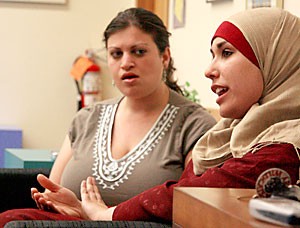The Israeli/Palestinian conflict is a polarizing issue that often spurs heated disagreements from both sides of the debate, but that hasn’t stopped a group of UA students from putting aside those differences and working toward a solution.
The Tucson Peace Project began this semester after the Union of Progressive Zionists came up with the idea to form a Jewish/Muslim student organization.
Although that group never materialized, Drew Alyeshmerni, a Judaic studies junior and participant at the Hillel Center took the idea and began coordinating an effort to draw up a realistic peace plan agreed upon by both Jewish and Muslim students.
Alyeshmerni said the initial plan was to hammer out a set of accords before the end of this semester, but it soon became clear that a great deal more research and dialogue between both sides would be necessary before any concrete agreements could be reached.
“”We’ve transitioned from the idea of (this semester) being a jam-packed writing session to more like opening the door,”” Alyeshmerni said. “”The focus shifted more toward community-building and building bridges between each other.””
Plans for composing the accords have been pushed back to the end of the next school year, giving the group more time to study all sides of the issue and form a plan that will address all aspects, Alyeshmerni said.
Around a dozen students have been meeting Monday nights at the Hillel Center since spring break hear from students and professors – both Muslim and Jewish – and learn about the many perspectives on the conflict that form divisions within sides as well as between them.
Aside from the creation of the accords, the project also has plans for a number of community outreach projects for next year, including bringing together children from local mosques and synagogues and possibly bringing Jewish and Muslim comedians to campus, said Sarah Dehaybi, a pre-physiology junior and president of the MSA.
“”We want to focus more on the education aspect and hopefully from there we can initiate everything else we can do,”” Dehaybi said. “”There’s a lot of sensitive information involved, and you can’t present that first.””
While getting to know one another, the group has been studying the history of the Israeli/Palestinian conflict from a number of different angles. One Muslim and one Jewish student pair off to write each section of the accords, including security issues, the handling of refugees and access to holy places, Alyeshmerni said.
“”I really didn’t know anything about the conflict before working with the project,”” said Jennifer Knutson, a science education junior and a member of the MSA, although she identifies herself as Christian. “”I’ve learned a lot about it, and I’ve also learned that there are people who are willing to put an end to it.””
The group is proud to be combining Jewish and Muslim ideas to solve these problems, Dehaybi said, but understands that the two groups working together is not the most popular idea on either side of the debate.
“”We understand that there are a lot of people who are not into coming (to our meetings),”” Dehaybi said. “”But if we push this in the right direction, I think it will become popular on both sides.””
Alyeshmerni, who will be leaving next year to spend time in Israel, said she hopes the project will continue to attract students and grow into a partnership that will serve as an example to communities everywhere that the two factions can work side-by-side towards a peaceful solution.
“”This has the potential to be so big,”” Alyeshmerni said. “”There are not many university groups in the country that are doing this kind of stuff.””
But even if the document is never finalized, Alyeshmerni said she is glad the project could connect even a few Jews and Muslims in a meaningful way.
“”I’ve learned a lot about both sides and have been able to put a face on both sides,”” Dehaybi said. “”I think it’s good for me as a Muslim to have people that I consider friends who are Jewish.””









